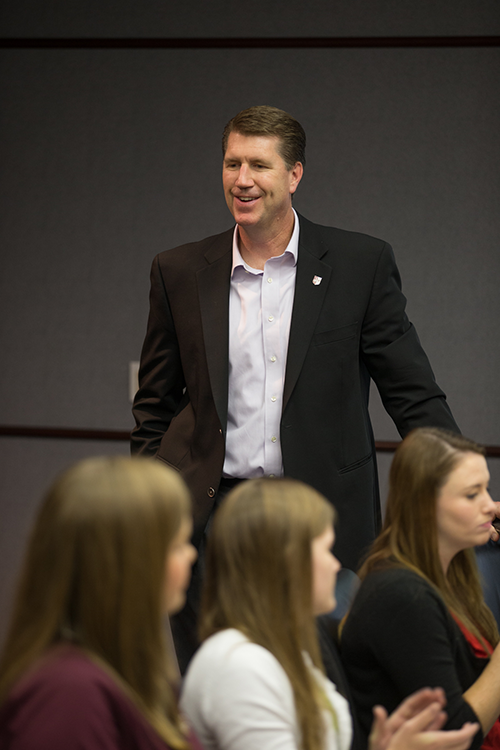Starbucks executive advises students to match jobs to their personal values
December 2, 2013
|
Mays Business School
Stephen Lovejoy smiled at the business honors student who brought a Starbucks cup to the conference table the day Lovejoy visited Mays Business School. “Good taste,” said the senior vice president, global supply chain for the Starbucks Coffee Company.
Affinity for one’s work place is a key element of job satisfaction, Lovejoy told the students. He says he feels fortunate to be at Starbucks, where he is responsible for the Asia end-to-end supply chain, global channels — including consumer products and food service — as well as global store development including the furniture, fixtures and retail offerings. “I just love the Starbucks mission:Â “To inspire and nurture the human spirit — one person, one cup and one neighborhood at a time.’ I get that. I give back to the community a lot as a person, so I want to work at a place that has those same goals and standards.”
Lovejoy started his professional career with Clorox out of college and worked there for 18 years, then worked for other companies before being recruited by Starbucks. He lives in Seattle, but over his career he has relocated eight times, and worked in 36 countries.
“I didn’t take the traditional path, but it was because I took the opportunities when they came up. I learned a lot that way and really benefited from it.” Starbucks recruited him in 2010 — when stock was $24 a share. The day he spoke at Mays, it was at $81.
The central message in his discussion with the students was advising them to find jobs that align with their own values. “It’s not just about the shiny penny, it’s about the day-to-day feel and smell of the place,” he explained. “If you try to talk yourself into it but it doesn’t feel right here (pointing to his belly), don’t do it. You’ll be miserable, and you’ll be looking for another job within a year or two.”
Lovejoy also advised employees to spend enough time at each position to really learn from it, even those that are less enjoyable. “The faster you go up, the narrower your foundation of experience and knowledge is.”
In 2008, Starbucks temporarily closed all its stores then “reset,” something Lovejoy called a “$30 million decision that paid off because everyone started over on the same page.” Now the company is on a high-growth path, with almost 19,000 stores worldwide. The 1,000th location just opened in China, Lovejoy’s largest market area of responsibility.
India is now the fastest-growing market, mushrooming from its first location a year ago to 29 today.
Starbucks is constantly exploring opportunities to enhance its base product line. New offerings include Teavana, a tea-centric shop in Seattle, and Evolution Fresh, a product line of non-heat-pasteurized juices and smoothies. “I love the pace,” Lovejoy says. “I will take growth problems over closing down a plant any day — it’s a lot more fun.”
About Mays Business School
Texas A&M University’s Mays Business School educates more than 5,000 undergraduate, master’s and doctoral students in accounting, finance, management, management information systems, marketing and supply chain management. Mays consistently ranks among the top public business schools in the country for its undergraduate and MBA programs, and for faculty research. The mission of Mays Business School is creating knowledge and developing ethical leaders for a global society.



